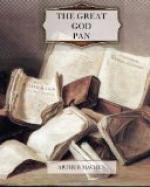“But you remember what you wrote to me? I thought it would be requisite that she—”
He whispered the rest into the doctor’s ear.
“Not at all, not at all. That is nonsense. I assure you. Indeed, it is better as it is; I am quite certain of that.”
“Consider the matter well, Raymond. It’s a great responsibility. Something might go wrong; you would be a miserable man for the rest of your days.”
“No, I think not, even if the worst happened. As you know, I rescued Mary from the gutter, and from almost certain starvation, when she was a child; I think her life is mine, to use as I see fit. Come, it’s getting late; we had better go in.”
Dr. Raymond led the way into the house, through the hall, and down a long dark passage. He took a key from his pocket and opened a heavy door, and motioned Clarke into his laboratory. It had once been a billiard-room, and was lighted by a glass dome in the centre of the ceiling, whence there still shone a sad grey light on the figure of the doctor as he lit a lamp with a heavy shade and placed it on a table in the middle of the room.
Clarke looked about him. Scarcely a foot of wall remained bare; there were shelves all around laden with bottles and phials of all shapes and colours, and at one end stood a little Chippendale book-case. Raymond pointed to this.
“You see that parchment Oswald Crollius? He was one of the first to show me the way, though I don’t think he ever found it himself. That is a strange saying of his: ’In every grain of wheat there lies hidden the soul of a star.’”




